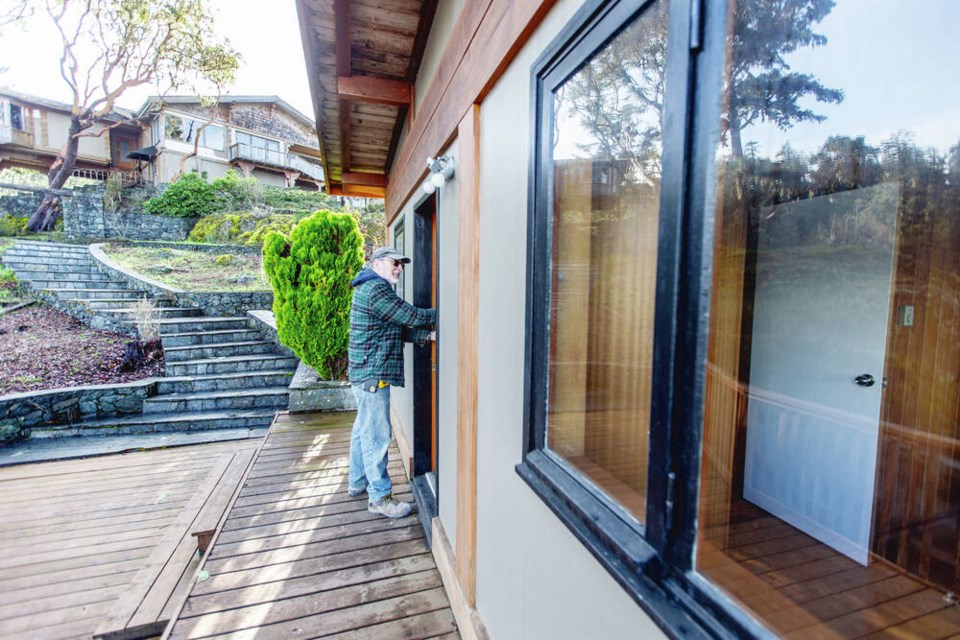Something sticks in my mind after recounting Brian and Sharon Holowaychuk’s plans to turn the Grouse Nest wilderness retreat in East Sooke into a haven for Ukrainian refugees.
It was when he whipped out his phone to show me something. His son has a girlfriend of Ukrainian ancestry whose sister is in the Ukrainian army. During one recent Russian assault, she videoed and shared with the family a series of tremendous explosions that painted the night sky red.
It was like watching Second World War footage, or the coalition assault on Saddam Hussein’s Iraq in the 1990s. But it was the contrast that was most striking.
We watched the snippet of a full-scale war on a tiny screen while standing in a wilderness paradise on the placid shore of the Sooke Basin. The rocket fire played from the phone into utter stillness. It’s so quiet at the expansive waterfront property, you can practically hear your pulse.
It’s the vision of rescuing some people from that lethal chaos and setting them up comfortably in that tranquil refuge that is driving the Holowaychuks.
Putting the phone away, Brian Holowaychuk said: “So for me, this is personal.”
Imagining traumatized people — mostly women and children, since men under 60 can’t leave the country — making that transition is an exciting and daunting proposition.
Lots of good-hearted people have the same vision of helping. But the Holowaychuks are planning on a larger scale. Brian, whose grandparents came to Canada as children, is aiming at housing up to 100 people in the old lodge and around the 33-hectare property. (See )
It will take an enormous amount of work. The 58-year-old building is quite rundown. It’s partly gutted, since the couple started demolition work for the renovation with a different idea in mind. Now some of the torn-down walls have to be restored after they pivoted to the new plan, which complicates things.
But Brian is a straight-ahead kind of person with a successful business track record.
He said Wednesday he has had various offers of help and some donations, and is getting a lot of interest.
That reflects people’s natural inclination to do something — anything — to help. Ukrainian President Volodymyr Zelenskyy’s gut-wrenching video shown to the U.S. Congress and the world on Wednesday will intensify that. So will reports that Russia bombed a theatre in the city of Mariupol in which many civilians were hiding.
But the goodwill in response to the atrocities runs into some hard local practicalities. Housing is the fundamental need for refugees. The Ukrainian Canadian Congress expects a few thousand to wind up in B.C. They will land in the midst of a housing crisis that is endemic and has been for years.
Provincial officials were occupied Wednesday with homelessness. They released a report that said 23,000 people were homeless at some point in the most recent year for which data was available. And the affordability crisis for people with housing has been a perennial issue.
There are some 200 refugee-accommodation offers on file at the congress’s Vancouver office so far, but it will likely still be a challenge to settle them properly. That’s why larger-scale efforts like the Ukrainian safe haven project at Grouse Nest deserve consideration.
Talking in terms of dozens rather than ones and twos would make a bigger difference when it comes to tackling a challenge that could grow exponentially in the days ahead.
Holowaychuk keeps a close eye on refugee coverage and talks about the bad situations civilians are caught in. He is keen to expedite the renovation to start making a difference as soon as possible for people now sleeping on cots in school gyms, or the like.
“We’ll keep patching this place up. Just keep fixing it up while they’re here, even.”
A plumber working on the site told Holowaychuk of his childhood. He was a Bosnian refugee who left that war when he was four years old and lived in a refugee tent camp for a year.
His observation while refitting the Grouse Nest was that just having a roof and heat and running water are appreciated after an experience like that.

